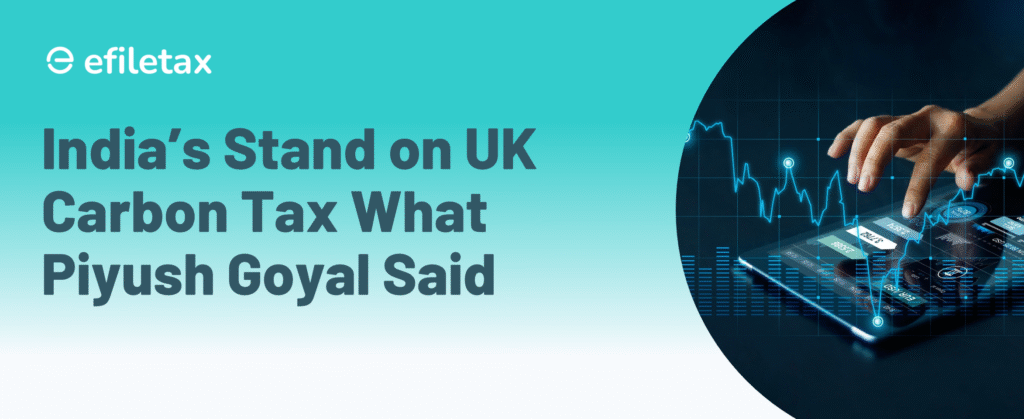
India’s Carbon Tax Response: What It Means for Trade and Policy
India’s carbon tax response is back in the spotlight as the UK considers levying a border carbon tax on imports from countries with high carbon footprints. Commerce and Industry Minister Piyush Goyal has made it clear: India will not sit silent if such a tax unfairly targets its exports.
This statement comes amidst growing tensions over climate-linked trade barriers and concerns about developed countries using carbon pricing as a disguised protectionist tool.
What Is the UK’s Carbon Border Tax?
The UK is reportedly exploring a Carbon Border Adjustment Mechanism (CBAM) similar to the EU’s, which imposes a levy on goods imported from countries with less stringent climate regulations.
Key sectors affected could include:
- Steel and aluminium
- Cement
- Fertilizers
- Power-intensive goods like textiles
Such a tax aims to curb “carbon leakage” — where businesses relocate to countries with looser climate rules.
India’s Official Position
Minister Goyal, while speaking at a G20 trade forum, stated:
“If any country taxes our exports in the name of carbon emissions, India will take appropriate measures to safeguard its trade interests.”
He emphasized that developing countries like India should not be penalized for emissions tied to historical development by industrialized nations.
Why This Matters for Indian Exporters
If the UK or other countries implement a carbon tax:
- Exporters may face added costs, especially in energy-intensive sectors.
- Compliance documentation may increase (carbon footprint certifications).
- There’s a risk of losing price competitiveness in global markets.
India’s Legal & Policy Options
India may explore the following countermeasures:
- Challenge the tax under WTO rules on non-discrimination (Article I and III of GATT).
- Impose reciprocal duties on imports from countries levying CBAM.
- Negotiate climate finance and technology transfers to meet global standards.
This aligns with India’s stand at COP summits that “common but differentiated responsibilities” must be respected.
Expert View: What Indian SMEs Should Do Now
“Carbon tax is not just about climate—it’s a trade compliance issue. Indian exporters should start calculating and reporting carbon footprints in line with international norms,” says Ankit Gupta, International Trade Advisor.
He also suggests businesses in steel, textiles, ceramics, and electronics to:
- Explore renewable energy adoption
- Use ISO 14067 or GHG Protocols to calculate emissions
- Start carbon offsetting and ESG reporting for brand credibility
Quick Comparison Table: EU vs. Proposed UK CBAM
| Feature | EU CBAM | UK Proposal (Expected) |
|---|---|---|
| Status | Under implementation | Under consultation |
| Targeted Goods | Steel, cement, aluminium | Likely same |
| Reporting Requirement | Mandatory from Oct 2023 | Likely to start by 2026 |
| Impact on India | High in core exports | To be evaluated |
What Can Indian Exporters Expect?
Short Term
- Consultation phase → Lobbying and diplomatic pressure
- Data gathering and carbon reporting pressure
Medium Term
- Cost increase if India’s goods are deemed “carbon intensive”
- Need for technological upgrades and cleaner energy sources
India’s Diplomatic Push: A Balanced Climate Policy
India has always emphasized climate justice, arguing that developing countries should not bear disproportionate burdens.
Recent CBIC and MEA briefings also hint that India may:
- Push for global carbon credit market access
- Demand climate transition funds
- Continue its Net Zero by 2070 pledge while safeguarding economic growth
Summary
India will “respond appropriately” if the UK imposes a carbon border tax on Indian exports, says Piyush Goyal. The proposed UK tax could impact Indian exporters in steel, cement, and textiles, prompting legal, trade, and ESG implications for Indian businesses.
FAQs
1. What is a carbon border tax?
A duty imposed on imports from countries with weaker climate policies, to equalize carbon costs.
2. Will India’s exports be affected?
Yes, especially carbon-heavy sectors like steel, cement, and ceramics.
3. How can Indian exporters prepare?
Start measuring product carbon footprints, improve energy efficiency, and maintain ESG compliance.
4. Is this tax WTO-compliant?
It’s debatable. India may challenge it on grounds of trade discrimination.
Final Word
Carbon tax may sound green, but it’s turning into a trade weapon. Indian businesses need to prepare not just for climate change, but compliance change.